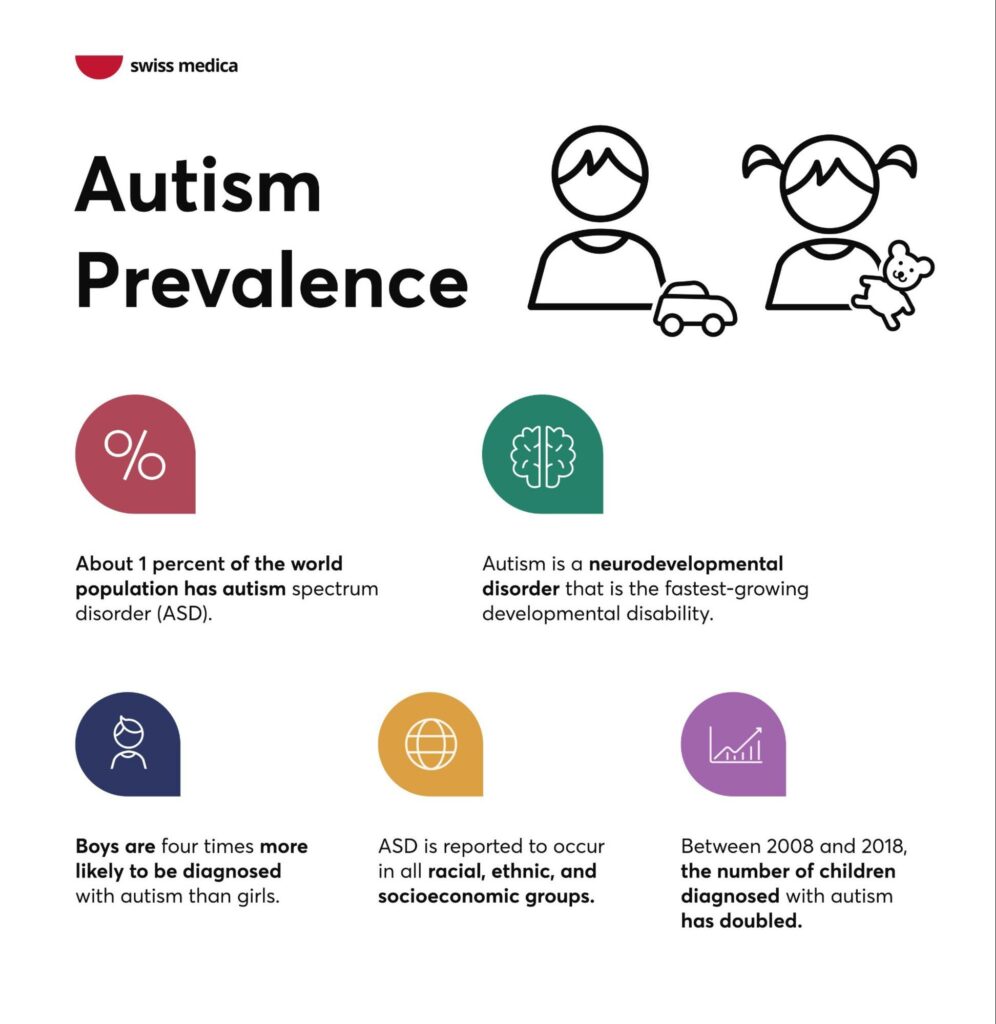Autism is a neurodevelopmental disorder that involves problems with communication and social interaction. Individuals with autism also display a limited range of emotion as well as repetitive behavior. There are several other symptoms and signs that are exhibited with this condition.
There are treatments and medications used for people with autism spectrum disorders (ASD) in a special facility, such as an autism therapy center, or autism treatment center. However, they are not curative and are only used to manage the symptoms. Stem cell treatment is considered not too often by individuals with autism and those with loved ones with autism. Yet, it holds promise and potential for exacting lasting change in patients.
This article will discuss the kinds of autism treatment therapy. These include medical and non-medical therapies. It will also discuss the treatment of accompanying conditions, and how stem cells are used to treat autism. Read on to learn more.
Types of autism treatment available
Over the years, new forms of treatment for autism spectrum disorder have been developed. This doesn’t only include medication to take care of some of the symptoms that the patients experience. It also includes autism therapy services to assist with the communicative and social deficits they may have.

Behavioral and non-medical therapies tend to be more effective for more permanent improvements. They help the patient actively modify their behavior to let them express their feelings and needs in acceptable ways. Medication is preferable for short-term treatment of some of the symptoms and signs of autism. In this case, though, the changes will mostly be seen for as long as the patient uses the medication.
Alternative medicine treatments have been used in attempts to manage autism spectrum disorder. These include dietary approaches, mind-body medicine, and chelation. Stem cell treatment, of course, is an autism therapy method that holds significant promise.
Contact us
Stem cell therapy presents an opportunity for recovery with benefits and proven efficacy. You can learn more about the autism treatment with stem cells, what are the expected outcomes, the cost and duration of the program.

Medical Advisor, Swiss Medica doctor
Medications used in the therapy of autism
The medications used in the treatment of autism are not expected to cure the condition. Instead, they deal with the accompanying symptoms which are likely to interfere with daily functioning. This includes inattention, seizures, anxiety, and hyperactivity.
It is important to keep in mind that medication is prescribed on a custom basis, with different outcomes depending on the patient. It is also best for medication to be combined with behavioral therapies to be most effective.
Risperidone and aripiprazole are approved by the Food and Drug Administration for treating autism, although there are many other medications used to treat a variety of symptoms. All these drugs that are usually prescribed for autistic persons include the following:
- Risperidone is an antipsychotic medication approved to treat irritability in patients with autism. However, it can also help with hyperactivity, aggression, and repetitive and poor social behaviors.
- Aripiprazole is also approved to manage irritability in children with autism. It has similar benefits as risperidone, helping to minimize aggression.
- Methylphenidate is a stimulant that is not approved for use in autism. However, it improves upon inattention and hyperactivity by increasing the patient’s focus.
- Venlafaxine belongs to a group of drugs called SNRIs. It can be used in autism to reduce the risk of self-injury and to improve focus.
Rivastigmine is a drug used in Alzheimer’s and Parkinson’s treatment, but it has been found to improve cognition in patients with autism as well.
Non-medical therapies
Non-medical interventions for autism are more capable of providing lasting improvements, particularly behavioral therapies. Autism therapy services typically provide different types of methods. However, the efficacies of non-medical treatments can vary greatly, although they have one important advantage: with proper instruction, they can be done from home. This provides the potential for improvement, even during quarantine.
Behavioral therapy
Behavioral therapy is the most utilized form of non-medical treatment for autism. They teach the patient to modify their behavior to make daily and social life easier. An autism treatment center will use multiple forms of behavioral therapy.

These include the following:
- Early Intensive Behavioral Intervention: This involves behavior-modifying exercises from a young age. Once started, it is expected to go on for years to be most effective.
- Positive Behavioral Support: This seeks the motive for the child’s negative behaviors. It then promotes the right behavior by modifying the child’s environment to support appropriate responses.
- Social Skills Training: Helps with the development of healthy social relationships. Teaches patients the proper ways to interact with other people, in their age group and out.
- Peer-Mediated Instruction and Intervention: An individual’s peers serve as ‘teachers’. A patient is meant to use the interaction with their peers as a template to model behavior after.
There are several other forms of autism treatment therapy that can be utilized, but these are just a few. New methods are constantly being developed.
Dietary treatment
Many people turn to special diets as a means of improving autism symptoms. These diets aim to restrict certain food components like gluten and casein. However, there is no scientific evidence that these diets provide any benefit, or that a diet can cause autism. Extreme caution should be taken when placing children on a special course of food. There is a possibility of nutritional deficiencies with restricted diets. It should always be discussed with a doctor.
Speech therapy
Patients with autism very commonly have issues with their communication and verbal skills. Autism rehabilitation therapy targets the ability to express the patient’s feelings, thoughts and needs by voice. It serves as a means to improve socialization through speech.
Speech deficits vary widely in patients with an autism spectrum disorder. Speech therapy allows for tailored treatment to make verbal communication easier.
Treatments for medical conditions that often accompany autism
There are several conditions that are very commonly seen in patients with autism. These include psychiatric conditions like depression, anxiety, and bipolar disorder. Epilepsy is frequently seen as well.
They needed to be treated as a whole, not neglecting the other conditions they may have. This is why an autism therapy center is advantageous. Medical treatment is used for essentially all of these conditions.
- Epilepsy: Valproate is an effective drug in the treatment of seizures in autism.
- Anxiety: Selective serotonin reuptake inhibitors (SSRIs) are commonly used to treat comorbid anxiety.
- Depression: Similarly, SSRIs can be used to manage depression in autism.
- Attention-Deficit Hyperactivity Disorder: Methylphenidate and amphetamine can be used. This is similar to regular ADHD cases.
Insomnia: Mirtazapine and melatonin were both shown to improve insomnia in children and adults with ASD.
Stem cell therapy for autism
Stem cells stimulate the regeneration and development of cells in target organs. In the case of autism, this is in the brain. By forming new neuronal connections and repairing impaired ones, changes can be seen. Besides this, there is also an increase in blood flow and oxygen delivery. These all work together to provide a better environment for brain functioning.
Stem cell therapy has shown efficacy in the treatment of neurologic conditions. Its effectiveness in autism treatment is not as well publicized as other treatments, and this is still a matter of debate. Despite this, it has been proven effective. As an example, a study done on 32 participants showed improvement in various domains. This includes social relationships, cognition, and speech. There was also a reduction in inappropriate behavior.
Similar to non-medical therapies for autism, changes seen with stem cells for autism persist for longer. At the same time, they require a lot less time spent when compared to behavioral therapy sessions for years. Despite this, combining the various forms of treatment as required is most effective.
Benefits* of customized autism treatment at the Clinic
There are many advantages to receiving customized autism treatment at Swiss Medica. This treatment is primarily provided at the Belgrade branch in Serbia.
The stem cells used are either adult mesenchymal cells, autologous cells, or donated ones. When donated, they come from a placenta or an umbilical cord. The latter eliminates ethical concerns regarding the sourcing of cells.
There is an option for patients who desire treatment but may not be able to travel to Europe. The clinic’s medical team is able to travel to a client’s location with the necessary personnel and equipment for treatment.
Each client is treated as a unique case, not just for adults alone, but children too. Their medical history is carefully taken and the necessary evaluations and tests are done. This information is used to tailor a customized autism treatment plan for the client. This ensures the highest chance of success. The qualified medical staff at the clinic will ensure holistic treatment. Most cases of autism treated with stem cells at our clinic show a degree of improvement, supported by autism therapy services. However, results vary depending on patient factors like age, genetics, nutrition, and more.
Contact us
Stem cell therapy presents an opportunity for recovery with benefits and proven efficacy. You can learn more about the autism treatment with stem cells, what are the expected outcomes, the cost and duration of the program.

Medical Advisor, Swiss Medica doctor
Medical Advisor, Swiss Medica doctor







